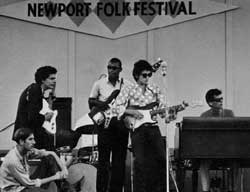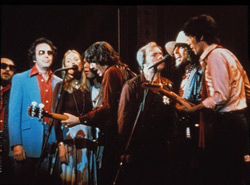Five Swedish Scientists Have Been Hiding Bob Dylan Lyrics In Articles For 17 Years!
By Stephanie Chase in Music / Festivals on 30 September 2014
And it all started with ‘Blowing in the Wind’…
Five Swedish scientists with a penchant for Bob Dylan, have been amusing themselves for 17 years by inserting the famous wordsmith's lyrics into their work, all in order to win a free lunch.
 Bob Dylan, inspiring Swedish scientists
Bob Dylan, inspiring Swedish scientists
The fun began in 1997 when Jon Lundberg and Eddie Weitzberg published a paper on flatulence (of all things) entitled ‘Nitric Oxide and Inflammation: The Answer Is Blowing In the Wind’. Several years later the duo then discovered that two of their colleagues, Jonas Frisén and Konstantinos Meletis, had also used a Dylan’s reference in the title of their 2003 paper about the ability of non-neural cells to generate neurons called, ‘Blood on the Tracks: A Simple Twist of Fate?’.
The discovery led to a bet between the four scientists, who could write the most articles with Dylan quotes before going into retirement, with the prize being a lunch at the local restaurant Jöns Jacob. Soon another competitor joined the bet, Kenneth Chien, a professor of cardiovascular research who had already penned a paper entitled, 'Tangled Up in Blue: Molecular Cardiology in the Postmolecular Era' in 1998.
More: Bob Dylan Named As The 2015 MusiCares Person of the Year
Articles which followed included 'The Biological Role of Nitrate and Nitrite: The Times They Are a-Changin’, in 2009; 'Eph Receptors Tangled Up in Two' in 2010; 'Dietary Nitrate – A Slow Train Coming', in 2011.
Speaking to Swedish newspaper The Local Eddie Weitzberg explained, “The bet is not for strict scientific papers. We could have got in trouble for that. This is for articles we have written about research by others, book introductions, editorials and things like that.”
More: Johnny Depp To Play Guitar On 'Lost' Bob Dylan Album
Weizberg also added that of course all four men where great fans of Dylan and they suggested he should win win the Nobel prize for literature. But as much as the five are loving the attention Weiztberg did tell the paper he would "much rather become famous for my scientific work than for my Bob Dylan quotes.”
Contactmusic
Movies and Trailers

The Other Side of the Mirror: Bob Dylan Live at the Newport Folk Festival Movie Review
Lerner, utilizing footage shot for his folk festival documentaries, presents Dylan in context with full...

Masked & Anonymous Movie Review
Masked & Anonymous, as a title, comes across as a vague, artsy moniker as inaccessible...

The Last Waltz Movie Review
The Band were one of the best rock groups of the '60s and '70s, creating...














